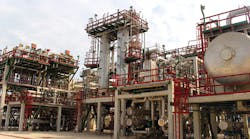TotalFinaElf SA will launch an exchange offer in France and North America for the 4.44% of Elf Aquitaine shares it doesn't own. The proposed exchange parity is 4 TotalFinaElf shares for 3 Elf Aquitaine shares, representing a premium of 11% based on the May 23 closing price in Paris. The offer implies a value of 219.6 euros for each Elf Aquitaine share. Elf Aquitaine will ask the respective market authorities to delist the shares from the Paris cash settlement market and to delist the American Depository Shares from the New York Stock Exchange. TotalFinaElf does not intend to initiate a procedure for a mandatory tender following the closing of the offer.
Technip Angola Ltd. has just started up in Luanda. The company is owned 40% by Angola's national oil company, Sonangol, and 60% by French company Technip SA. It was formed to help transfer know-how to Angola and increase the share of local firms in industrial projects. Technip Angola has also signed a contract under which it will act as project manager for construction of a new refinery in Angola. In addition, Technip will act as adviser to the Interministries Committee, which is headed by the petroleum minister. That committee is charged with assessing the products market, the refinery project, the investors, and the financing for the proposed project. The planned refinery is viewed as a milestone in Angola's economic development and is one of the Angolan government's main priorities.
Russia's Tyumen Oil Co. (TNK) said it will bid for Slavneft if Russia proceeds with privatization (OGJ Online, May 25, 2000). A merger would propel TNK into the top three Russian oil firms, in terms of production, behind Lukoil and Yukos. Company officials told Moscow press that Slavneft would be an excellent strategic fit for TNK, which is focused on maximizing shareholder value and has already made several acquisitions. Adding Slavneft would help TNK achieve economies of scale and would ensure a balance between upstream and downstream operations. Such a balance is crucial for stabilizing cash flow and maximizing margins. A merger would take advantage of the geographic proximity of their operations in the Moscow region and in Western Siberia, facilitating access to hard-currency exports and domestic consumers. TKN and its affiliates own 12.6% of Slavneft, 26.8% of its upstream subsidiary Megionneftegaz, and 33.1% of Yaroslavlnefteorgsintez, Slavneft's major refinery and petrochemical plant northeast of Moscow. Slavneft is owned primarily by Russia and Belarus.
